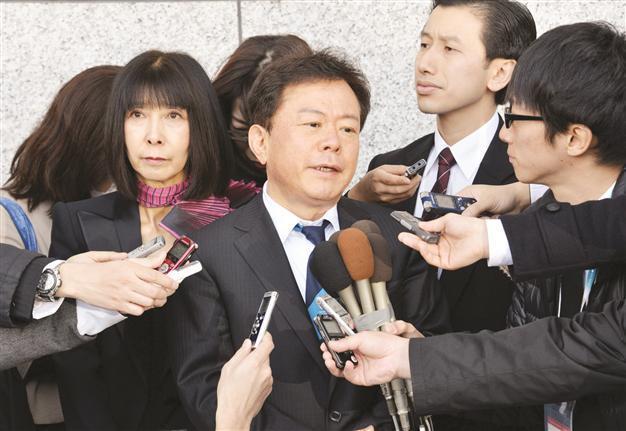Tokyo’s Olympic bid ‘needs lobbying power’
WASHINGTON - Agence France-Presse

Tokyo Gov Naoki Inose (C) is surrounded by correspondents. AFP photo
Tokyo won praise from an International Olympic Committee (IOC) team scrutinising its bid for the 2020 Summer Games, but commentators say it needs to boost its lobbying clout if is to impress Olympic chiefs.
The Japanese capital spent a reported $6.4 million hosting a tour by the IOC evaluation commission who will visit rival candidate cities Madrid and Istanbul later this month.
Over four days, they attended functions and presentations involving Prime Minister Shinzo Abe, Toyota chairman Fujio Cho and other dignitaries. They toured existing and planned sites for 2020, where they were welcomed by cheering crowds of Olympians and citizens.
“We have been hugely impressed by the quality of bid presentations,” the commission’s chairman, IOC vice president Craig Reedie, said in his summing up on March 7.
He also noted “strong government support,” wide-ranging contributions from the business community and public “enthusiasm” in Tokyo. But the commission is famous for its diplomatic finesse.
“Wherever they go, they never put you down publicly even if they rate you negatively,” Waseda University sports marketing professor Munehiko Harada, who has been involved in Japan’s previous Olympic bids, told AFP.
The team will prepare a lengthy technical report on the bids for the 101 IOC members before they directly hear appeals from the three cities on July 3-4. They will finally vote on September 7 in Buenos Aires to choose the 2020 host.
Greek support for Turkey
“Top-level diplomacy will lead the race now. This is where Japan lags behind,” Harada said, citing Greece’s pledge to support Istanbul’s bid at a summit with Turkey this week.
When Tokyo lost to Rio de Janeiro four years ago in the race for the 2016 Games, then Tokyo governor Shintaro Ishihara said “invisible dynamics were at play” in a selection possibly influenced by top-level nation-to-nation deals.
“Insufficient lobbying was cited as a reason for the defeat,” public broadcaster NHK said. “Tokyo’s ability in this area was put to the test.” Despite a few question marks, Rio de Janeiro’s 2016 bid was described by the commission in a technical report as “detailed and of a very high quality” while the other candidates -- Tokyo, Chicago and Madrid -- were given lower marks. Rio became the first South American Olympic host. At that time, IOC president Jacques Rogge was “intent” on spreading the Olympics to South America,” a Japanese Olympic Committee (JOC) official told Jiji Press.
